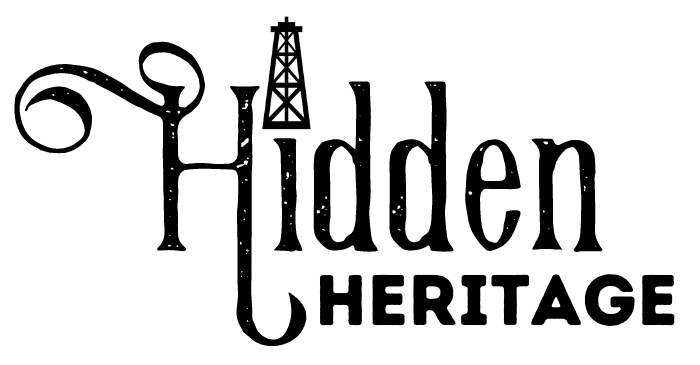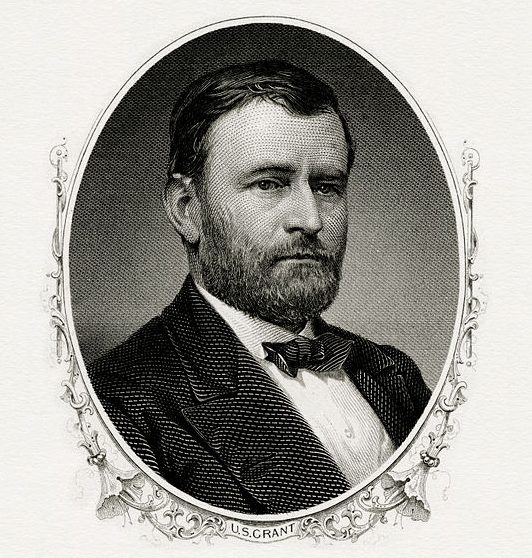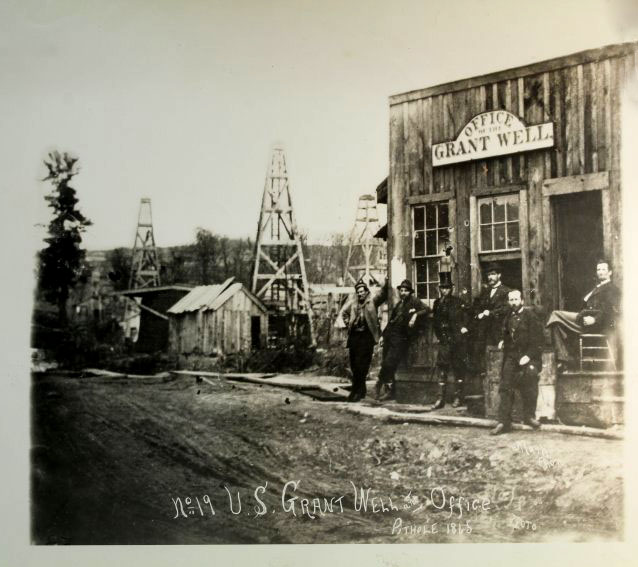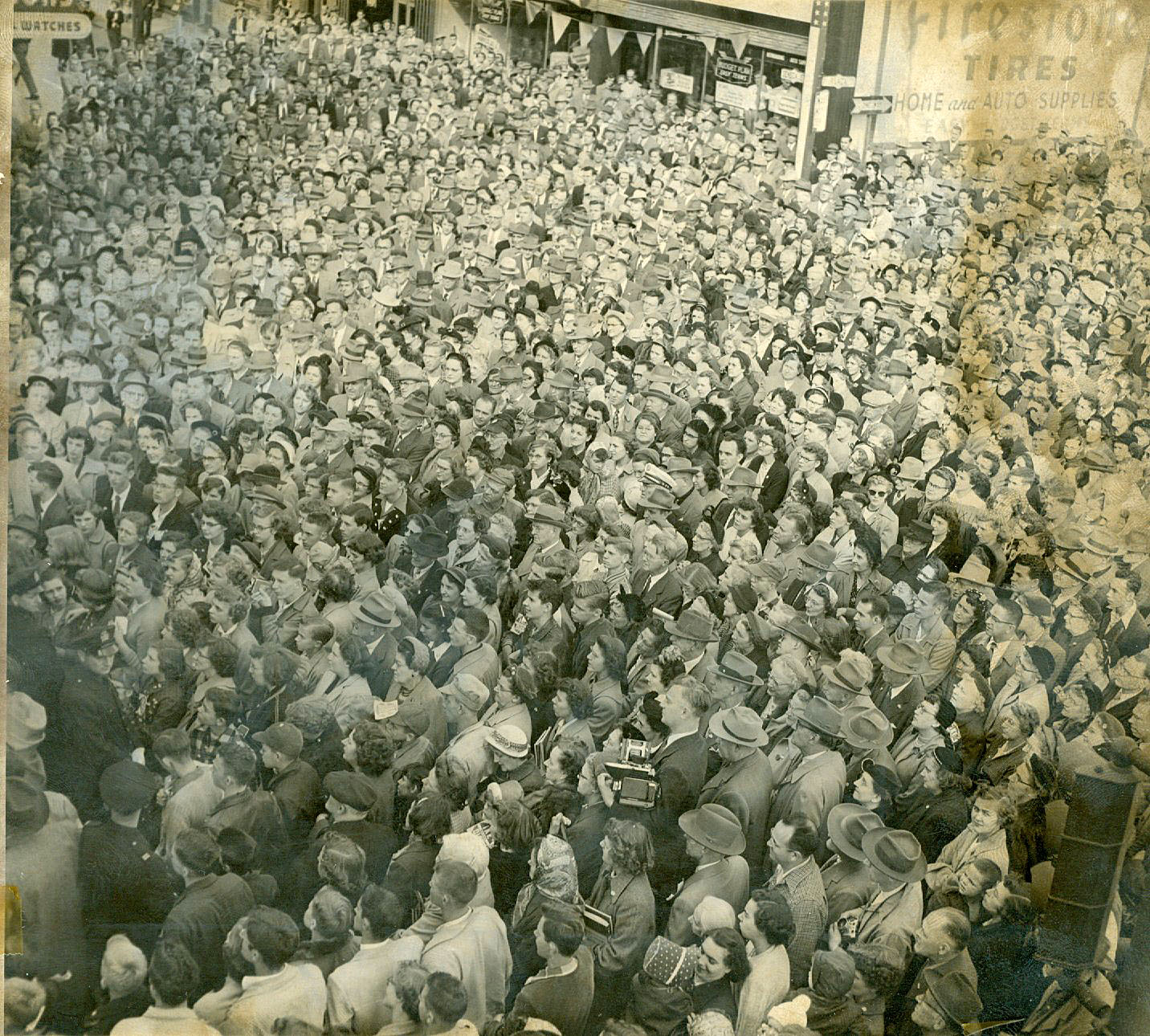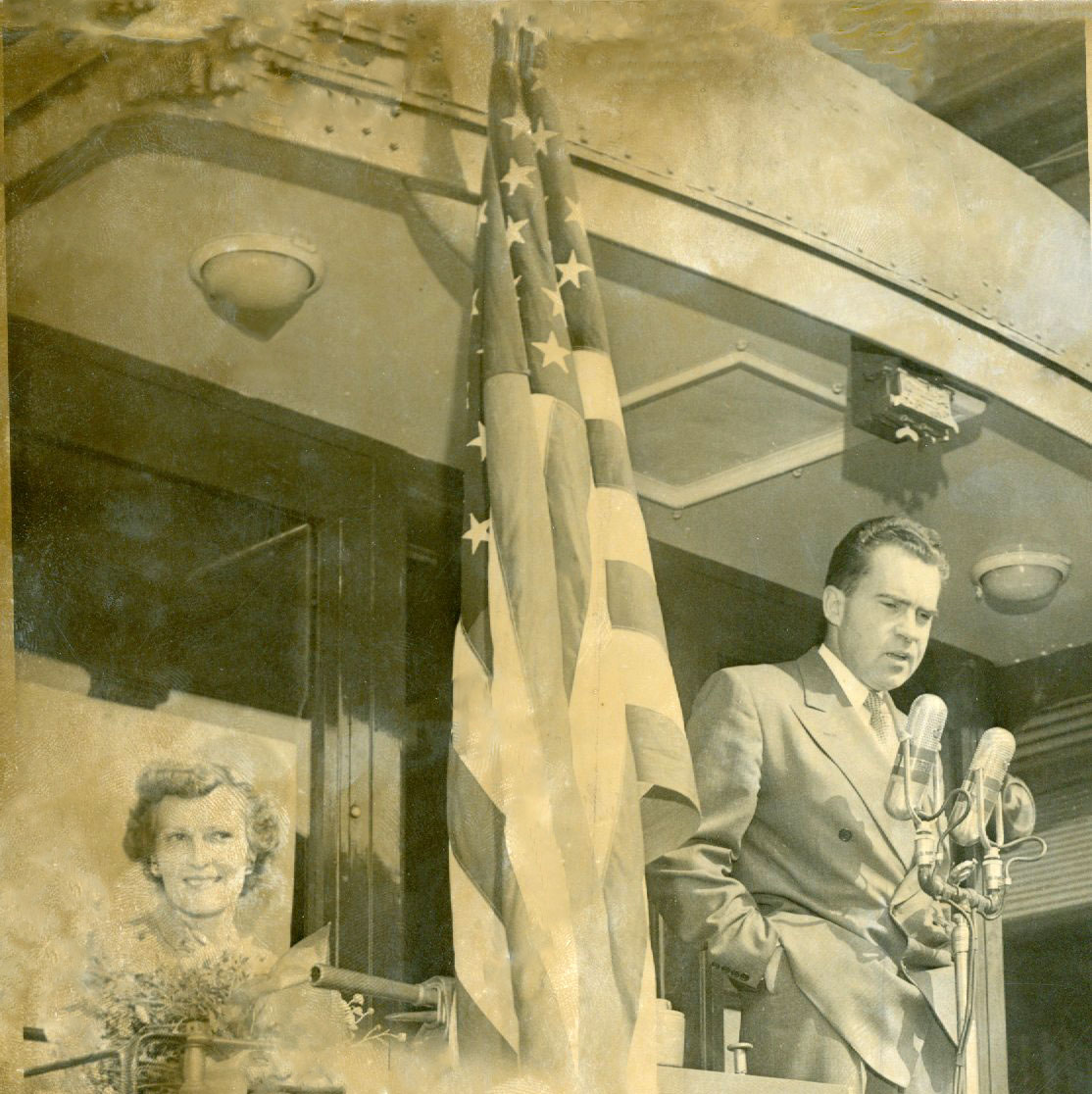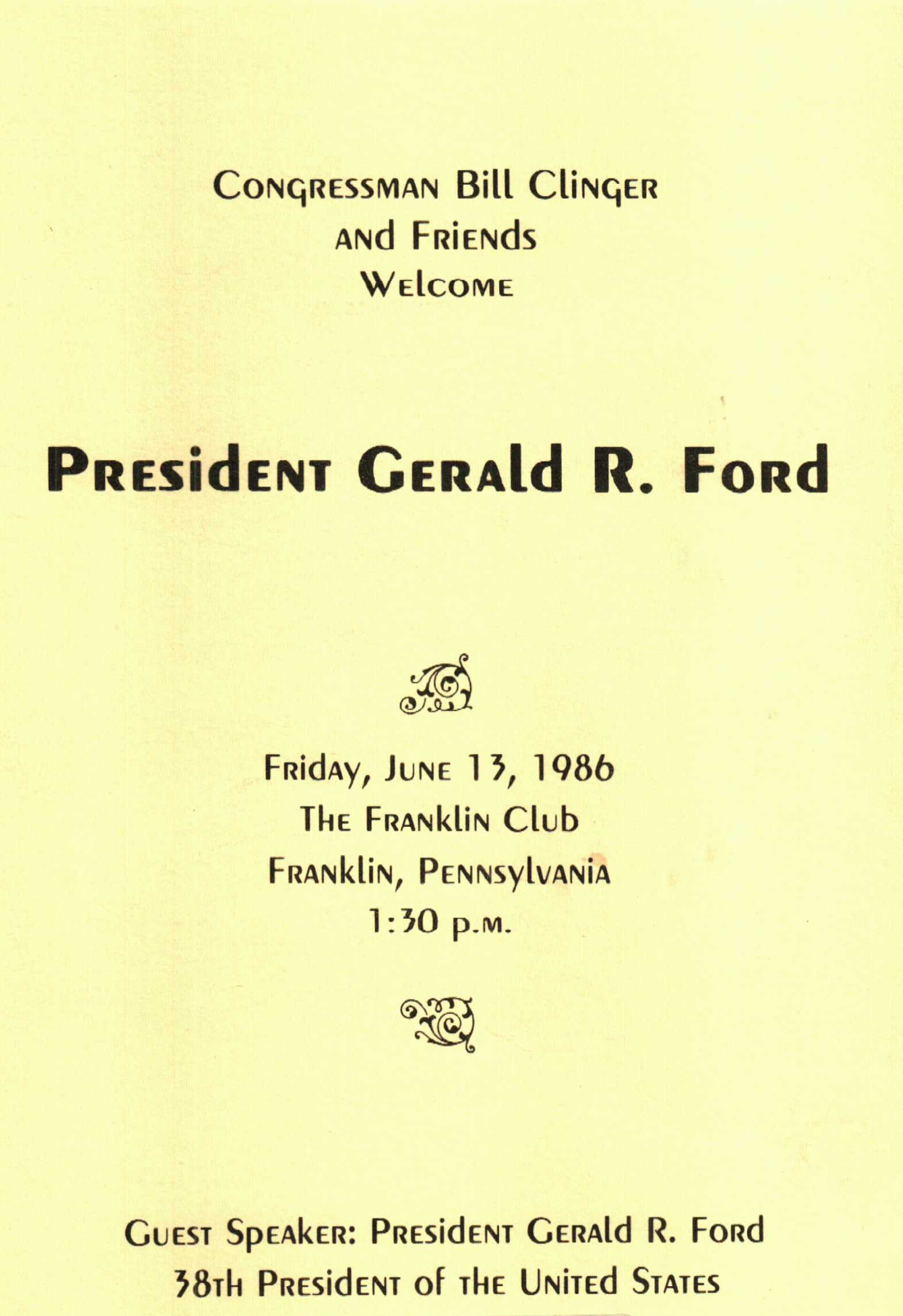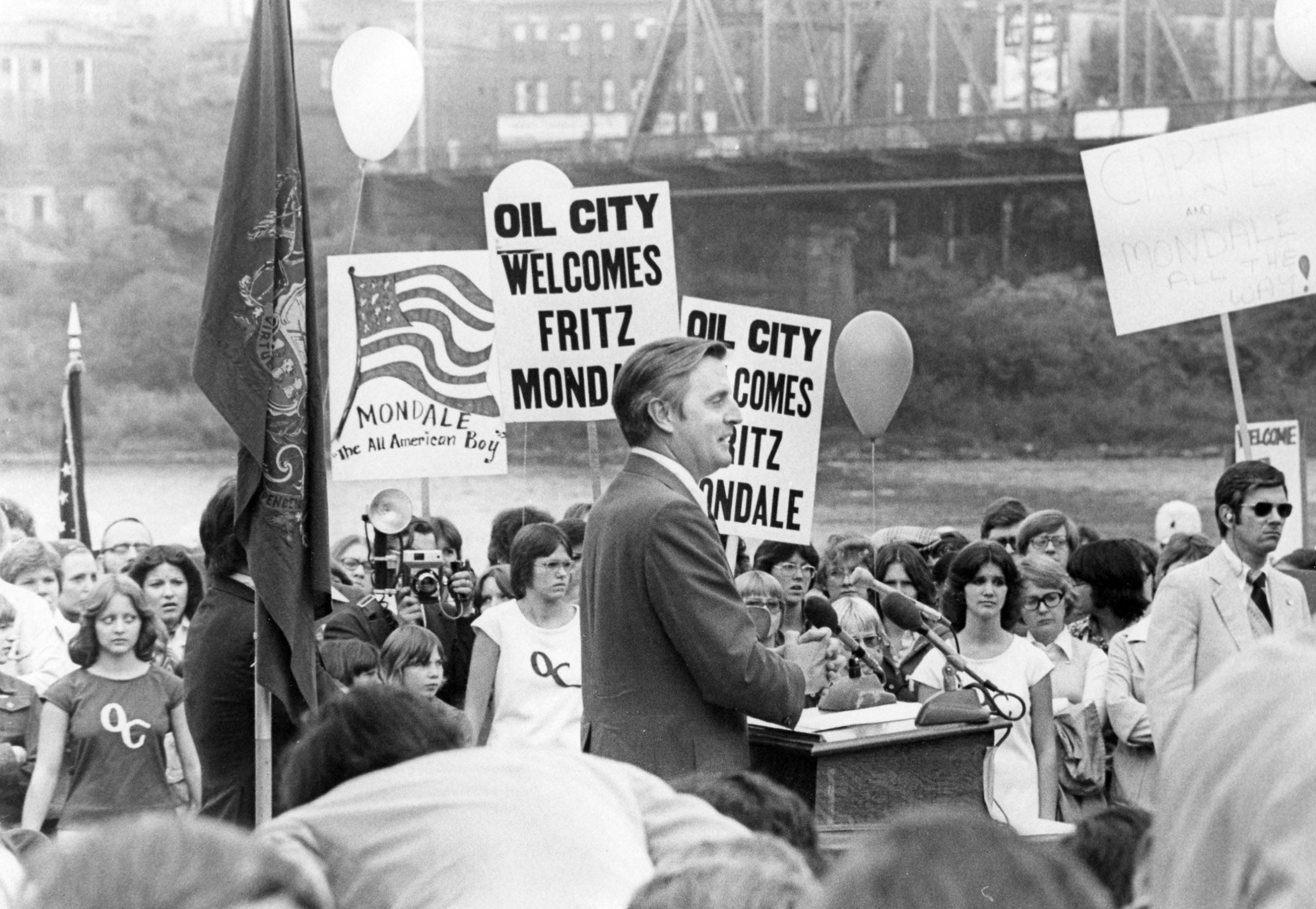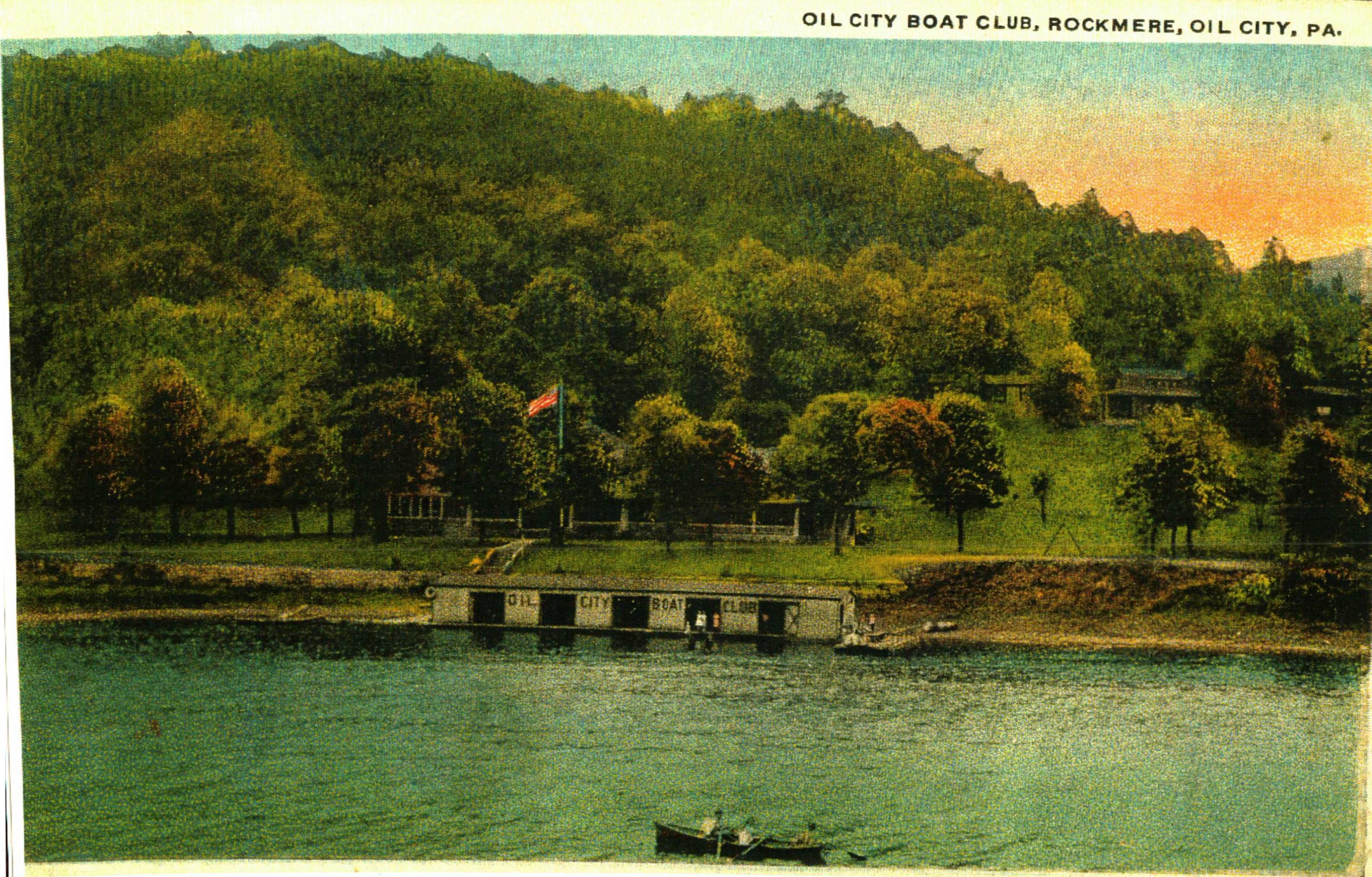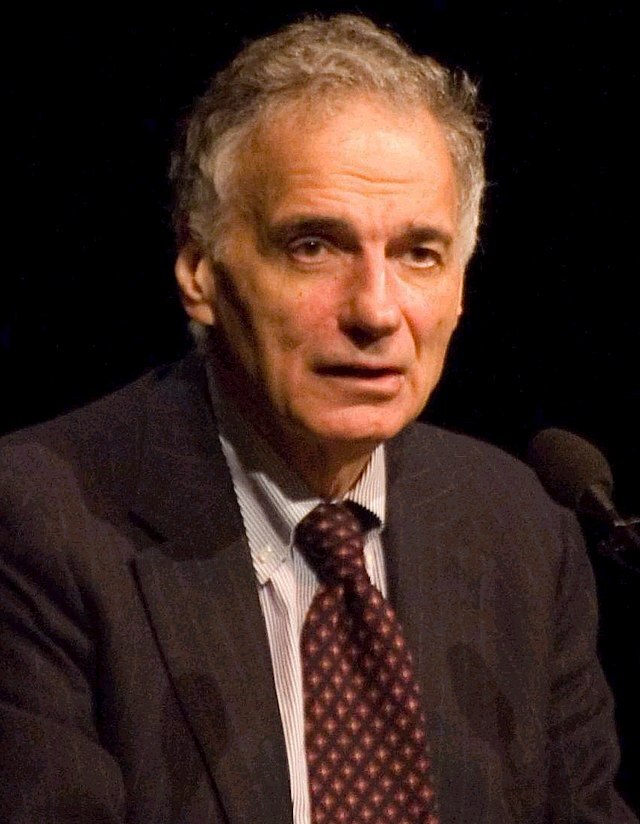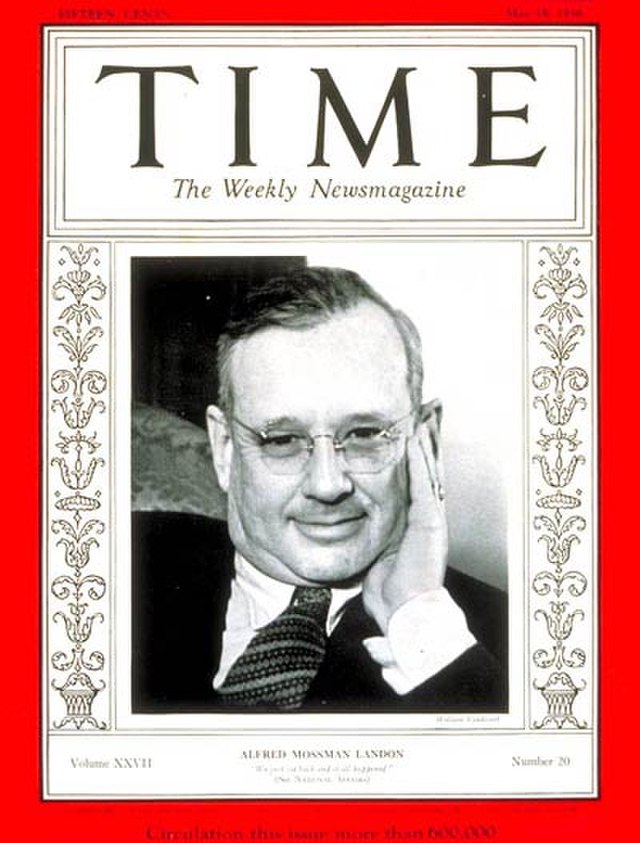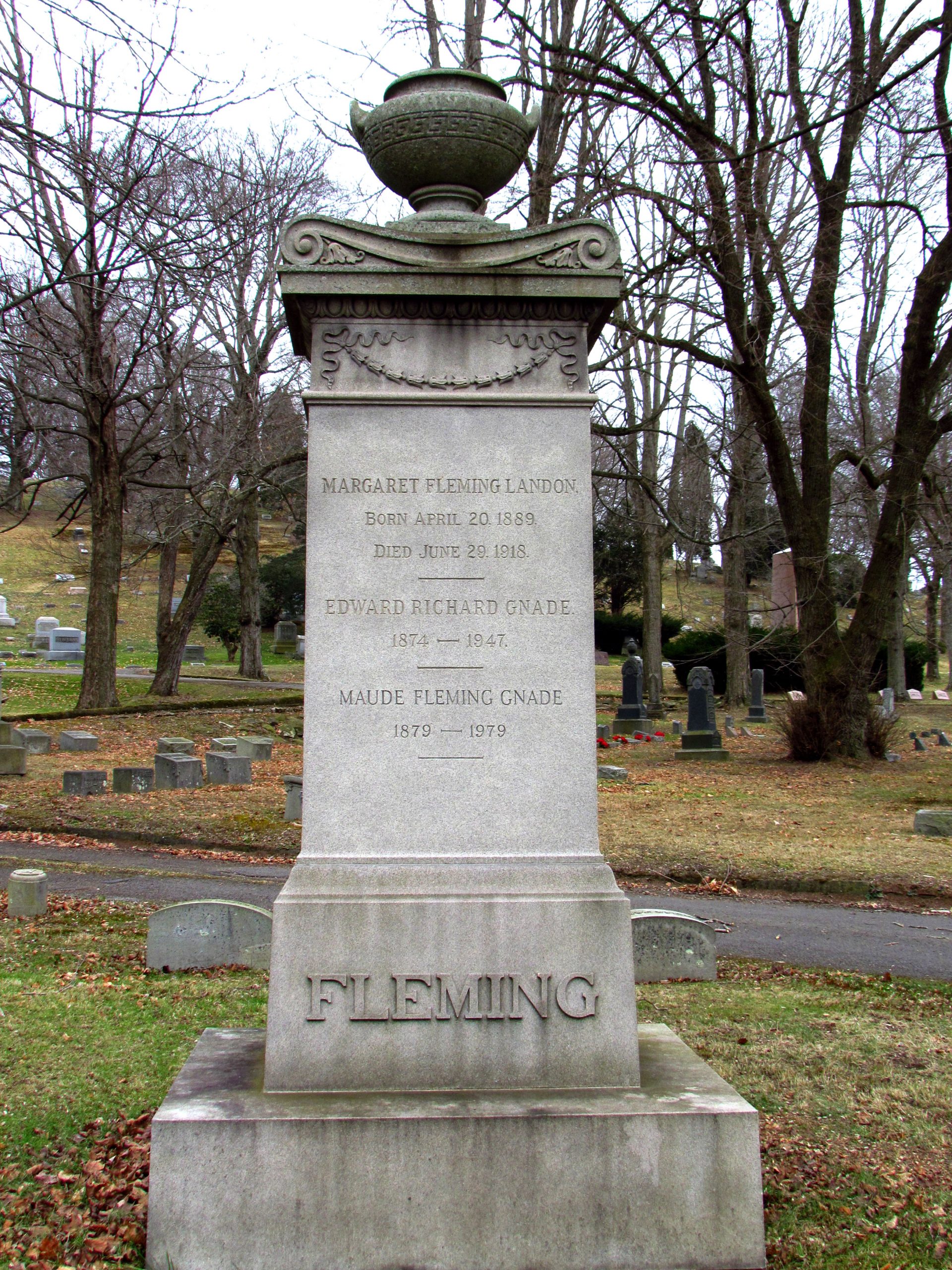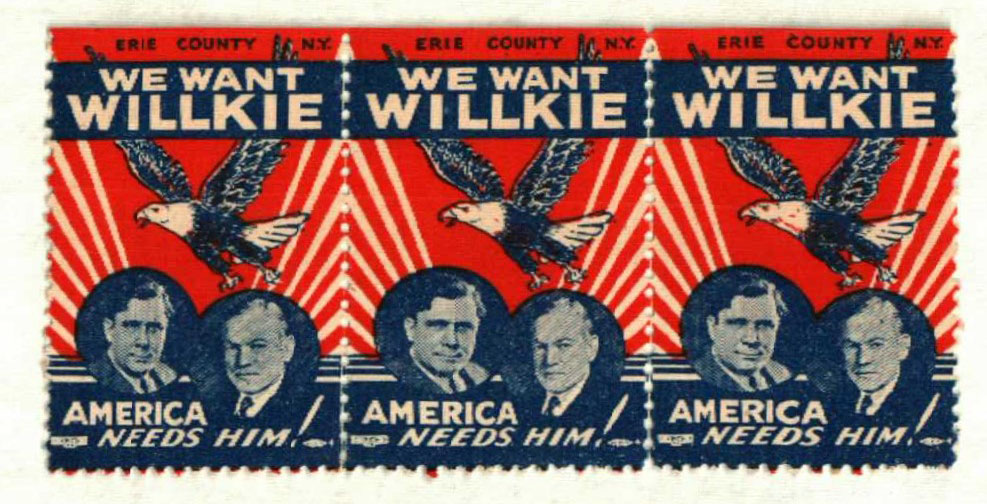Presidential Visitors
- Judy Etzel
- May 12, 2023
- Hidden Heritage
- 11836
The Oil City area has traditionally drawn a wide assortment of politicians in search of voter support and the entourage has included presidents, senators, congressional members and more. The region has played host to aspiring candidates as well as incumbents and retired national leaders.
Four presidents – George Washington, Ulysses S. Grant, Richard Nixon and Gerald Ford – claim top honors as the highest ranking office-holders to travel to the region.
George Washington
In 1753, George Washington, on assignment from the Pennsylvania governor to warn the French to leave western Pennsylvania, stopped in Venango County enroute north to begin talks with the commander of the French troops.
It was in early December when the 21-year-old surveyor stayed a day or two at Fort Machault at Venango, later known as Franklin. It was Washington’s first military mission and consisted of a 1,000-mile round trip from Williamsburg, VA, to the French-controlled areas in western Pennsylvania.
After traveling to Erie’s Fort LeBoeuf, he returned down French Creek to Franklin on December 22. He departed the next day for Virginia.
Ulysses S. Grant
In mid-September 1871, President Grant traveled to the Oil Valley during his first term as president. His visit was coordinated by Pennsylvania Congressman C. W. Gilfillan of Franklin at the behest of several prominent oilmen eager to promote their industry. It was six years after the Civil War had ended and two years into Grant’s first term in office.
On September 14, Grant, accompanied by his wife and their three children, arrived by a special train on the Oil Creek and Allegheny Railroad to Titusville. At a reception in the Parshall House hotel, the president thanked the oil industry for offering the nation “the sinews of war”. It was in reference to the region’s petroleum production that Grant said fueled the Union cause and gave it “a cash crop” for international trade.
“I can not help remember what this section of our common country did during the war,” he told the crowd. “I remember the men you sent to the front and, more than all, the value of the staple product of this section.
“Your great discovery gave us the sinews of war by supplying a substitute for our cut-off of cotton and gave us an exchange for exportation to keep our credit good in Europe. Oil took the place of cotton to exchange for gold,” said Grant.
Re-boarding the train, the entourage traveled south through Petroleum Center and into Rouseville where several Union Army veterans gathered to cheer their former commander.
South to Oil City, the train stopped at Oil City’s Third Ward train station off Main Street. The Oil City mayor and council members greeted the president and told him the visit was very special in that it came during the same month as the city was fully incorporated.
Grant spoke to oil producers at the Oil Exchange, enjoyed lunch at the Duncan House and then headed via train to Reno where he stopped to witness a gushing oil well. He observed it, noted the local newspaper, with “silent astonishment.” The train then proceeded to Franklin where the President spoke briefly in front of the courthouse. The group then left by train for Pittsburgh.
In a newspaper account of Grant’s visit, the first and only visit to the city by an incumbent president, it was noted: “The whole reception at Oil City … was marked by the total absence of partisanship. The sole object of the masses seemed to be to do honor to the highest official of the Nation. … Democrats and Republicans vied with each other in honoring the office by courtesies to the man who fills it, maintaining its true dignity, regardless of party strife.”
Richard M. Nixon
Richard Nixon, a U.S. Senator and the GOP nominee for vice president on Dwight Eisenhower’s presidential ticket, came to Oil City on October 10, 1952, as part of a campaign trip through western Pennsylvania.
Nixon, introduced by Harold R. Clark, chairman of the Venango County Republican Committee, gave a 35-minute speech from the rear platform of a 14-car train at the railroad plaza off Seneca Street near the State Street Bridge. Prior to his talk, Oil City’s famed American Legion Band, known as the 40&8 national champions, entertained the large gathering. One group held high a sign that said, “We’re Fixin’ for Nixon.”
A crowd of more than 4,000 people were gathered in the plaza. The spectators included St. Joseph High School and Oil City High School students who were let out of classes to attend the rally. In addition, downtown stores and offices were closed for a few hours to allow employees to see the vice presidential candidate.
Nixon, whose campaign swing was called “Take Nothing for Granted,” focused his speech on the Communist threat. His wife, Pat, stood beside him during the talk.
The candidate, who drew waves of applause from the crowd, signed hundreds of autographs while standing on the train platform. About an hour and a half after arriving, the Nixon campaign train turned north enroute to another rally in Erie.
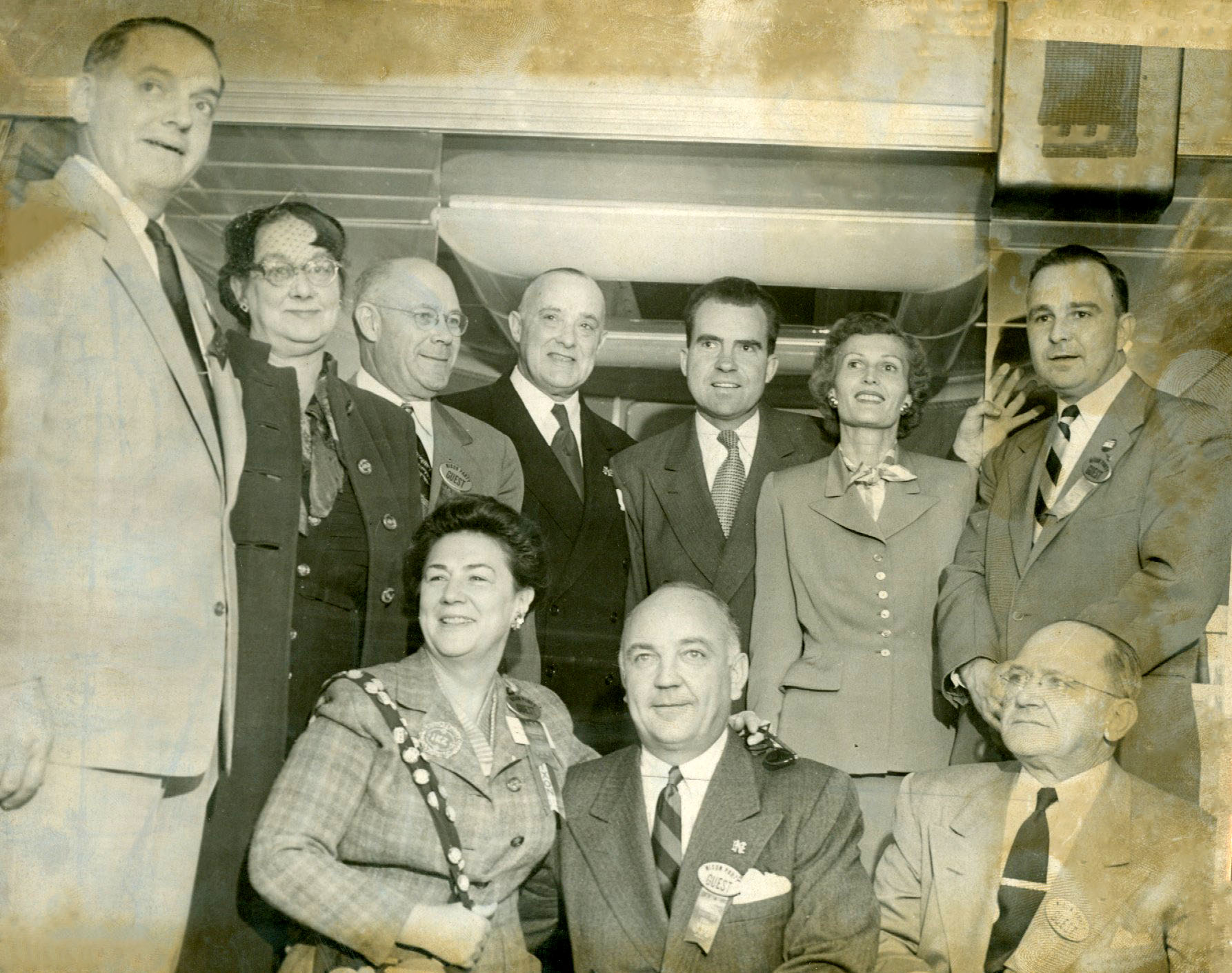
Gerald Ford
Congressman Bill Clinger of Warren drew former President Gerald Ford to this area in 1986 in support of the Republican legislator’s re-election campaign.
Ford formally endorsed Clinger at a reception held at the airport in Franklin on June 13, 1986. He later was a guest speaker at a luncheon at the Franklin Club.
H. William White, an attorney and county judge, offered the welcome and George Needle led the group in the Pledge of Allegiance. The invocation was given by Rev. Roger Wagner, pastor of Second Presbyterian Church.
Ford had visited Venango County before as the U.S. House minority speaker on February 6, 1971. He was the featured speaker at the Venango County Republican Party’s annual Lincoln Day dinner.
Barely a year later, Ford was named vice president. He ascended to the presidency in 1974 when Nixon resigned from office.
Oil City and the surrounding area also drew a wide array of other politicians and their surrogates, including:
Marilyn Quayle
Marilyn Quayle, wife of GOP vice presidential candidate Dan Quayle, campaigned in Clarion on October 10, 1988.
She was guest of honor at a ribbon-cutting ceremony to open the borough’s new gazebo and gave a brief stump speech there to about 300 people.
Walter Mondale
The first ever visit to Oil City by a national Democratic candidate for vice president came on September 30, 1976, when U.S. Senator Walter Mondale of Minnesota came to stump for the Carter/Mondale ticket. The trip was arranged by Jack Baker, Venango County Democratic Committee chairman and a former Oil City Council member.
Mondale arrived via a 100-passenger U.S. Airlines 727 jet, the largest plane to land at the Franklin airport, and brought with him a large entourage that included 75 national press corps representatives. Greeting him at the airport were Franklin Mayor Guy Mammolite, Venango County Commissioner Lou Judson and county Democratic Committee vice-chairman Jane Judson.
He traveled by motorcade to Justus Park in Oil City where he addressed about 2,500 people at a noon time rally. His talk was broadcast later that day on the MacNeil-Lehrer Report on PBS. While here, Mondale invited the Oil City High School marching band, color guard and majorettes to march in the Inaugural Day parade in Washington, D.C. The Oilers accepted the invitation and marched in the parade in honor of the Carter-Mondale winning ticket. During the inauguration parade, Mondale stepped out of his motorcade car in front of the Oil City High School Band and shook the hand of every band member.
Woodrow Wilson
Numerous anecdotal reports suggest President Woodrow Wilson visited this area.
He reportedly stayed at the Brown cottage in Rockmere just up the river from Oil City. His relative was Mrs. Douglas (Nancy Wilson) Brown of Oil City.
Wilson also spent a week with Joseph C. Sibley at his River Ridge estate. He was, according to news accounts, accompanied there by William Jennings Bryan.
William F. McKinley
President William F. McKinley of Ohio visited Oil City in the late 1800s. There are reports that he was a guest at the River Ridge Estate, owned by Joseph C. Sibley, along the Allegheny River.
While he was here, he was the keynote speaker at a large political rally at Monarch Park a few years before being elected president in 1896.
McKinley welcomed a large Oil City group at his Ohio home in September 1896. The pilgrimage to Canton included members of the Women’s Club of Oil City. They presented floral arrangements to McKinley and were invited into his home to meet the candidate’s mother.
The national wire service carried a story on the Oil City contingent’s visit and it was printed in daily newspapers across the U.S.
Norman Thomas
Norman Thomas, a five-time presidential candidate on the Socialist ticket, appeared as a guest speaker in October 1939 in a community forum in Oil City.
The evening forum, held at the South Side Junior High School, was one of two scheduled over a two-week period. Thomas was one of four featured speakers. At the forum, Thomas called for a firmer declaration on the part of the American people of their intention “to stay out of war.” The peace candidate was referring to what would ensue as World War II.
Thomas had his name on ballots across the U.S. every four years from 1928 to 1948 as the Socialist candidate.
Horace Greeley
Horace Greeley, the founder of the New York Tribune newspaper and the New Yorker magazine, came to Oil City in November 1872 during his campaign for the presidency.
Greeley, who popularized the saying “Go West, Young Man,” was defeated in his election bid by Ulysses Grant.
Ralph Nader
Ralph Nader, a third-party candidate for president, visited Oil City a number of times in the 1990s. In August 1994, he was the featured speaker at an anti-nuclear waste rally at the Venango Vo-Tech School.
Nader returned to Oil City in June 1996 for a fundraising event at the National Transit building. Nader’s non-profit, Institute for Civic Renewal, was housed briefly at the Transit. Nader briefly owned the Transit Building and adjacent Annex.
Alfred Landon
Alfred “Alf” Landon, a perennial presidential candidate from Kansas who was born in West Middlesex, Mercer County, married Margaret Euphemia Fleming of Oil City in January 1915. They were married in the home of her mother, Mrs. William Fleming, at 310 Central Ave. The officiating clergyman was Rev. Samuel A. Cornelius of Second Presbyterian Church. Wedding gifts were displayed on the second floor and the items ranged from a diamond necklace from the bridegroom to a baby grand piano.
Once married, the couple moved to Missouri where Landon began the practice of law. They had two children.
Margaret died in 1918 and is buried in Grove Hill Cemetery.
Landon returned to Kansas and was elected governor. He remarried and a daughter, Nancy Landon Kassebaun, to his second wife, was elected to the U.S. Senate.
In 1936, Landon, the Republican candidate for president, was soundly defeated at the polls by Franklin D. Roosevelt.
Landon’s grandfather was Rev. W.H. Mossman and he was the first pastor of the Rouseville Methodist Church.
Wendell Wilkie
Wendell Wilkie was in Oil City during his candidacy for president in 1940.
The Clymer, New York, native made hundreds of speeches while campaigning in New Jersey, Pennsylvania, Ohio, Kentucky and Indiana.
Some Oil City residents told reporters that they saw the candidate riding in an open convertible during a brief tour of the city.
Meanwhile, an Oil City resident was responsible for starting the Wilkie-for-President clubs in 1940.
Webb D. Allen of Oil City, described in news accounts as “a staunch Republican and superintendent of the Senate storeroom in Harrisburg,” launched the idea to promote Wilkie’s candidacy.
“The club immediately ‘caught on’ and now it has been brought to the attention of state and national leaders with the result that plans have already been made for state and national movement,” noted the media.
The Allen family resided on West 4th Street in Oil City.
Jennifer Wesner
The April 1988 primary election ballots in Pennsylvania included an area woman’s name for U.S. President.
Jennifer Wesner, former Mayor of Knox Borough in Clarion County, gathered enough Democratic signatures for her name to be placed on the Democratic ballot.
Opposing her for the party nod were Albert Gore, Jesse Jackson and Michael Dukakis.
The 54-year-old Clarion County native, who ran unsuccessfully twice for county sheriff, fell far short of securing the nomination in the spring primary. Dukakis won the nod in Pennsylvania.
DID YOU KNOW?
William M. Parker, an Oil City resident, was elected to the Pennsylvania Supreme Court on November 4, 1941.
Parker attended Princeton University in 1891 and studied law in the office of F. W. Hayes and John L. Mattox in Oil City from 1892-1895.
He touted an extensive list of professional experience including teaching mathematics at the Oil City High School for 2 years, entering a partnership with Judson David Trax from 1895-1925, serving as President Judge in the Venango County Court of Common Pleas for 7 years, serving as a judge in the Superior Court of Pennsylvania for 8 years and serving as the president of a local Red Cross chapter during World War I.
He died in office on August 5, 1943.
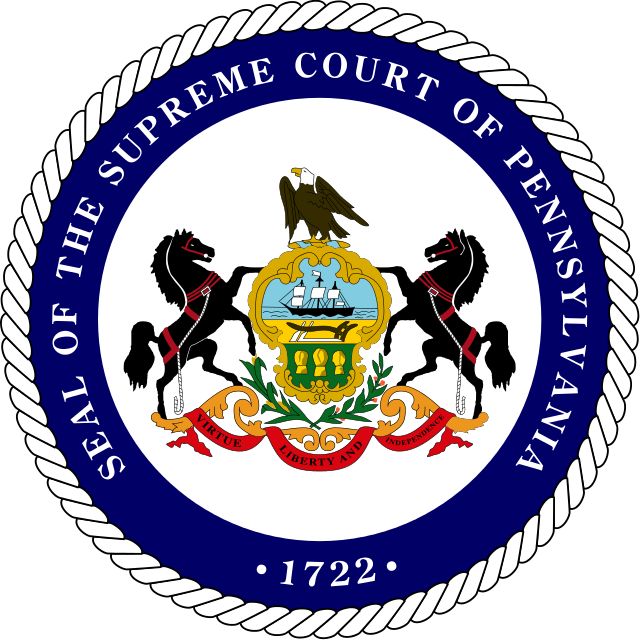
Written by Judy Etzel with research by Kay Dawson and design by Natalie Cubbon.
HIDDEN HERITAGE IS SPONSORED BY:
Jack Eckert & Susan Hahn
— In Memory of Carole Eckert —
Support This Project
Donations to the library are appreciated to help offset printing costs & make this project possible! Want to become a sponsor? Email us at promotions@oilregionlibraries.org to get started!
Make a Donation